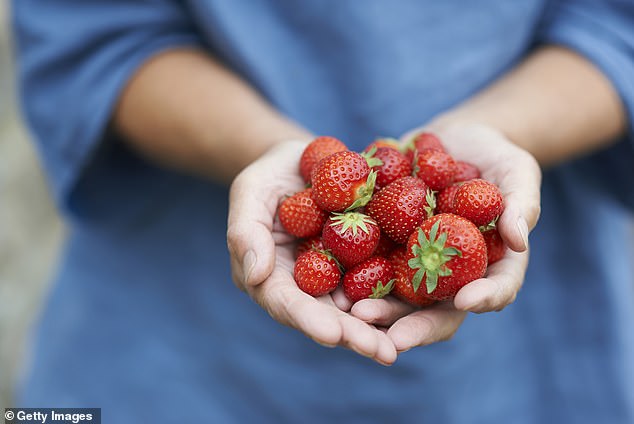Table of Contents
Eating a bowl of fresh strawberries is a simple and healthy pleasure. Or rather, it was until a recent alarming report revealed that they were among the “dirty dozen” fruits and vegetables sold in our supermarkets.
Analysing the latest government data, Pesticide Action Network UK found that 95% of strawberries, organic or not, contain PFAS pesticides, also known as “forever chemicals” because once consumed, there is no way to get rid of them.
PFAS pesticides found in 95 percent of strawberries
PFAS, or per- and polyfluoroalkyl substances, have been linked to health problems including cancer, high cholesterol, reduced kidney function, thyroid disease, low fertility, weakened immune systems and low birth weight in babies. This is disturbing news, especially since the other 11 “dirty” ones include fruit favorites such as grapes (61% of samples contained PFAS), cherries (56%), spinach (42%), tomatoes (38%), peaches and nectarines (38%), cucumbers (22%), apricots (20%), beans (15%), spices (8%), cabbage (7%) and lettuce (7%).
Only apples and potatoes were relatively free of PFAS – just 2% contained them. The “dirty dozen” PFAS are a mix of insecticides and fungicides, and include lambda-cyhalothrin (an insecticide highly toxic to humans and bees), which is found in apricots, beans, cabbage, cherries, grapes, lettuce, peaches/nectarines, spinach, strawberries and tomatoes.
PFAS are part of a group of nearly 15,000 synthetic chemicals and are used in consumer products around the world, and many of them have leached into soil and drinking water over time. That’s why even washing fruits and vegetables with water can’t remove them. Plus, soft, juicy fruits with a high water content are more likely to contain PFAS pesticides.
So what to do with this information? Go on a bacon-and-chips diet? Absolutely not. “There’s no need to panic,” says Gabriela Peacock, a nutritional therapist who has worked with clients including Prince Harry, Princess Beatrice and Joan Collins.
If we support both our immune system and our liver in its detoxification function by consuming a healthy, balanced diet rich in a variety of fruits and vegetables, we optimize our body’s “amazing ability” to deal with a small amount of chemicals from the environment.
Nutraceutical expert Peacock says that while the findings on PFAS are valid – “it is becoming increasingly clear that overuse of pesticides can have harmful effects on the human body” – it is not advisable to exclude these polyphenol- and fibre-rich foods from the market. If we are concerned, we can choose fruits and vegetables with lower pesticide content “to ensure we have all the vitamins and minerals we need”.
Below, Peacock recommends how to mitigate the potential risks associated with pesticide residues and suggests simple swaps for products most likely to contain PFAS. But she stresses that “the benefits of these foods outweigh the potential risks, especially if they come from cleaner, organic sources, so don’t feel like you need to eliminate them from your diet entirely.”
GABRIELA’S SEVEN TIPS
FROZEN OVER FRESH
It is disconcerting that 95% of strawberries sold in UK supermarkets contain chemicals that cannot be removed. However, strawberries (like other berries not analysed in this research) are high in polyphenols that promote health and longevity. As I recommend to my clients, buy organic fruit if you can and buy frozen berries. Not only is frozen fruit very beneficial (it is picked directly, the antioxidants are intact and it does not require preservatives to extend its shelf life), it is also significantly cheaper than fresh.
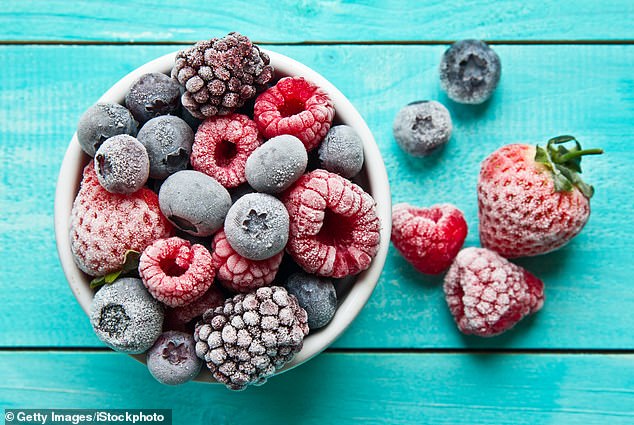
Frozen fruit does not need preservatives to prolong its life.
CANNING TEST
38% of the tomatoes tested contained PFAS, so what are our alternatives? Try red bell peppers, rich in vitamin C and lycopene, great for heart health. But sometimes, just one tomato is enough. So if you’re making a sauce, use canned organic tomatoes (with higher levels of lycopene than fresh), cheaper and relatively low in pesticides. Or use double-concentrated organic tomato paste, inexpensive, delicious, sweet and packed with lycopene. Again, if it’s organic, it will have less PFAS.
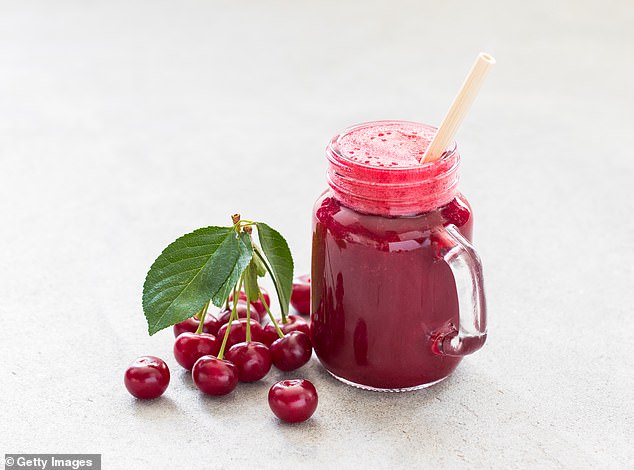
Cherry juice can help reduce inflammation and improve sleep quality.
JUICE INCREASE
Cherries are good for us, even though 56 percent of those sampled in the research did contain PFAS. You can try drinking tart cherry juice instead, though, for its health benefits, including reducing inflammation and improving sleep quality. If the juice is organic, it will contain minimal amounts of chemicals, as well as a much higher concentration of beneficial flavonoids. But if you prefer, swap the cherries for cranberries, known for their urinary tract health benefits and antioxidants. (Reassuringly, the fruit juice company Ocean Spray once rejected cranberries grown in an area contaminated with PFAS. Subsequent testing over three years by the U.S. Food and Drug Administration found that among the cranberry samples, almost none contained detectable levels of PFAS.)
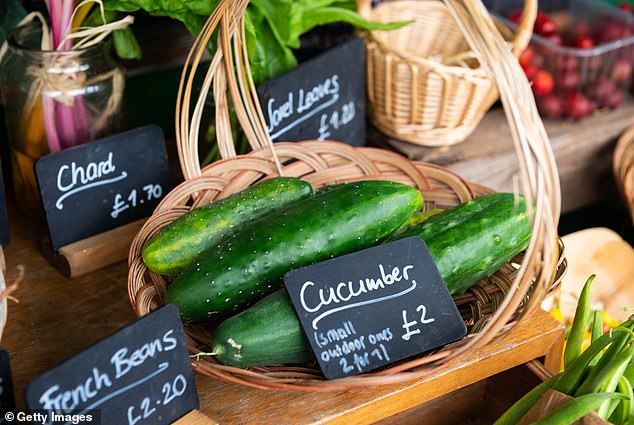
Try your local farmers market and get curious about where your produce comes from, says Gabriela Peacock
DIVERT THE SUPERMARKET
Cucumbers, apricots, beans, spices, cabbage, lettuce, potatoes and apples contain a much lower amount of PFAS, but if you are still concerned, buy organic if possible as it will contain fewer chemicals overall. Consider UK-grown produce, rather than imported fruit and vegetables, as some countries may have more lax pesticide restrictions than the UK. Also, imported fruit and vegetables need an extra level of preservation for the journey. As I tell my clients, be curious about where your produce comes from. Don’t always buy from supermarkets. Try your local farmers’ market, for example. Eat local and feel good!
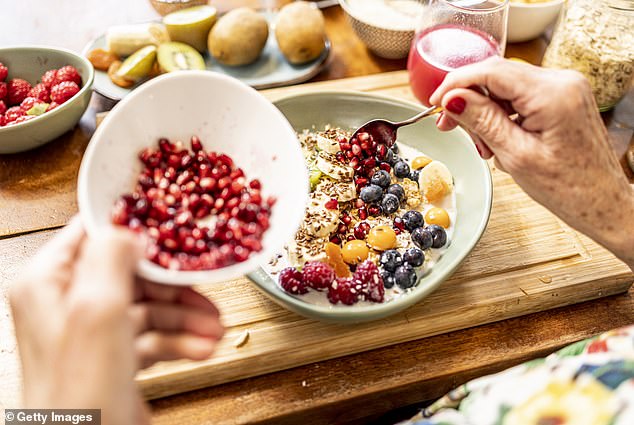
Pomegranates are rich in antioxidants and pair well with other fruits for breakfast.
INCREASE YOUR VITAMINS WITH VARIATION
If you don’t like the idea that 61% of grapes contain PFAS, there are some delicious alternatives. Vary your diet with antioxidant-rich pomegranates, digestion-friendly kiwis, or vitamin C-packed oranges. People love grapes, but they’re high in sugar and low in nutritional value. Opt for organic produce if you can. Including a wide variety of foods in your diet and buying organic produce can help mitigate potential risks associated with pesticide residues. As the Pesticide Action Network UK points out, of the 490 substances approved for use as pesticides in the EU, only 28 are approved for use in organic farming. Eating this way can help ensure you’re getting a wide range of vitamins, minerals, and health-promoting compounds.
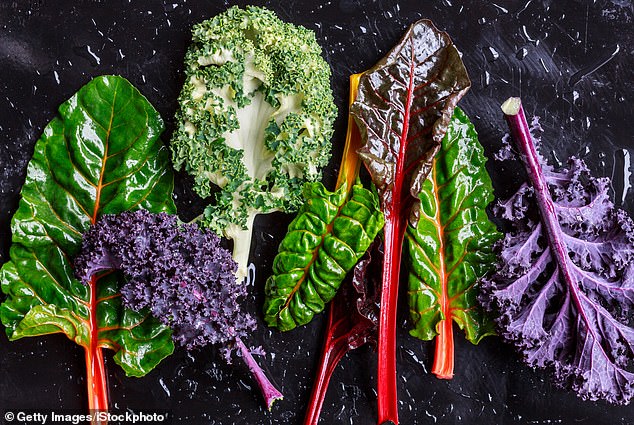
Purple kale and Swiss chard are packed with vitamins A, C and K.
AVOID PRODUCTS PACKAGED IN PLASTIC
Forty-two percent of the spinach samples contained PFAS, so replace them with a mix of other leafy greens like kale, Swiss chard, and collard greens, which are packed with vitamins A, C, and K and minerals like calcium and magnesium (though they may contain similar levels of PFAS, you eat fewer leaves per serving). And don’t forget cruciferous vegetables like broccoli and Brussels sprouts, which are rich in antioxidants and anti-inflammatories. Some leafy greens may contain higher levels of PFAS because, as noted in a study last year in the journal Food Chemistry, plants accumulate PFAS either from the environment, absorbed through their roots or leaves, or through exposure of their edible parts to pesticides during cultivation. If possible, buy minimally packaged and unchopped vegetables: The study also found that “washing, chopping and packaging” could increase contamination and that “ready-to-eat products contained higher concentrations of PFAS” compared to fresh and frozen vegetables.
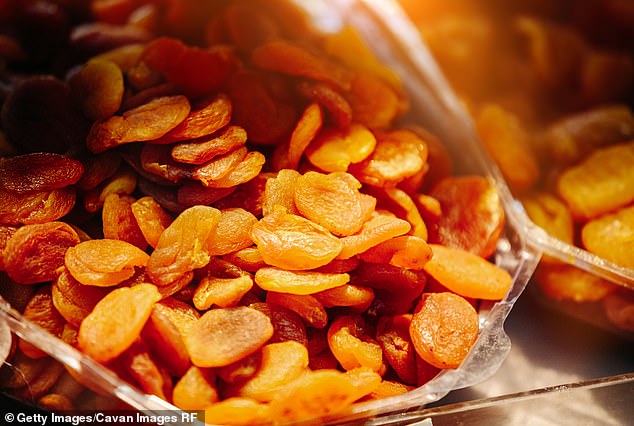
Dried apricots are rich in vitamins A and C.
SUPERFOODS WITH SKIN
An analysis found that 38% of peaches and nectarines contained PFAS. Alternatively, try organic dried apricots, rich in vitamins A and C, or plums, packed with antioxidants. Or opt for mangoes, which offer similar health benefits and boost skin health. The obvious benefit is that you don’t eat the skin of this fruit, so you won’t be ingesting any topical chemicals. Incidentally, an Australian government test in 2017, albeit with only two samples, found that mangoes were below the “trigger point” for PFAS in the fruit.
- Gabriela Peacock is the bestselling author of 2 Weeks To A Younger You: Secrets To Living Longer And Feeling Fantastic.gpnutrition.com)


